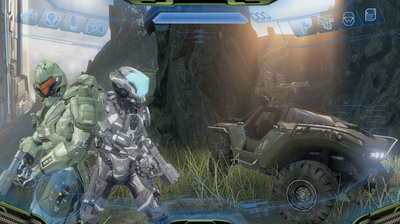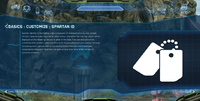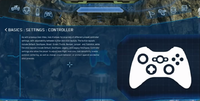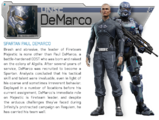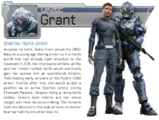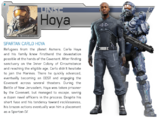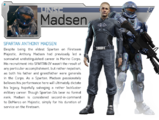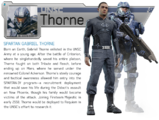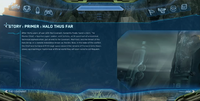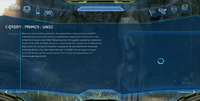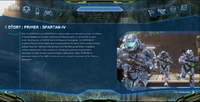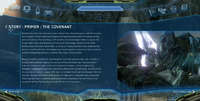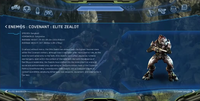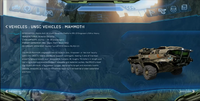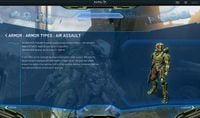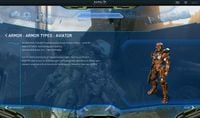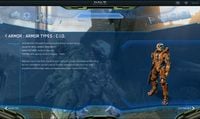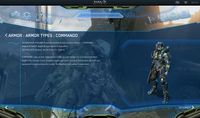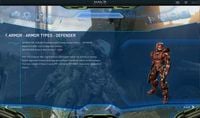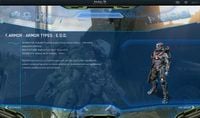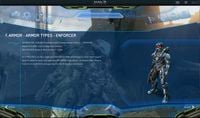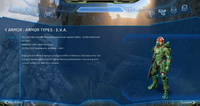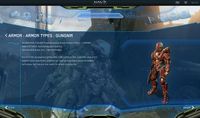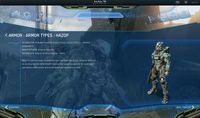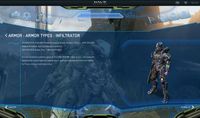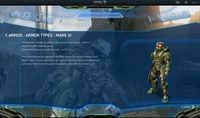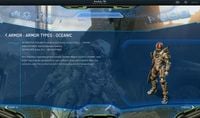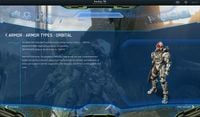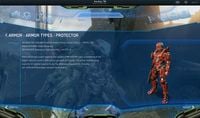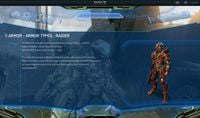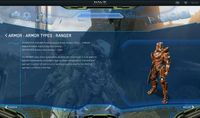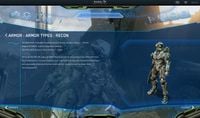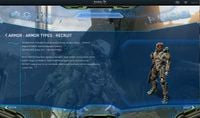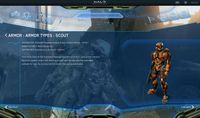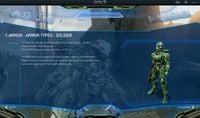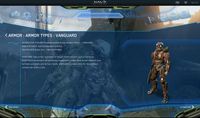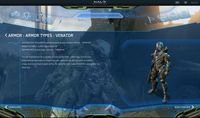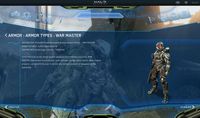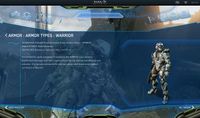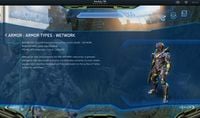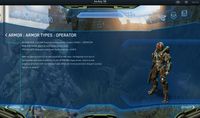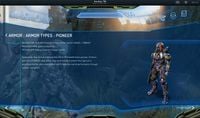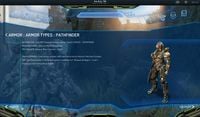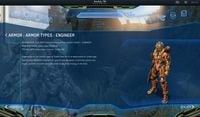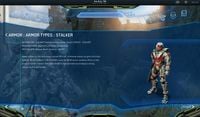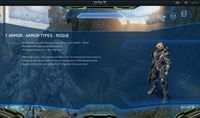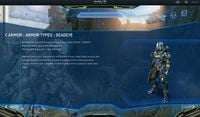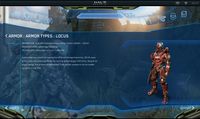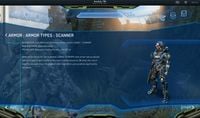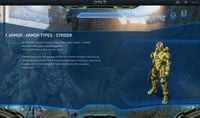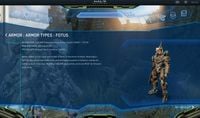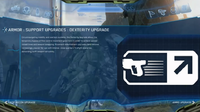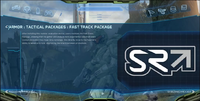Halo 4 Interactive Guide: Difference between revisions
From Halopedia, the Halo wiki
(→War Games: *Gametypes done) |
(→Maps) |
||
| Line 211: | Line 211: | ||
===Maps=== | ===Maps=== | ||
*'''Outcast''': Set in a desert cliff environment, Outcast is a fortified network of rebel facilities hidden in one of Talitsa's remote and hard scrabble territories. This is why you can expect the medium-sized labyrinthine map to be a treasure-chest of explosive, four wheel (and flying)-fueled battle. | |||
*'''Perdition''': New Carthage has always been a shining example of a healthy, growing colony -but hidden below the sky-high city of Pilvrosis this dangerous secret: one of the reactors is failing, the entire city is now under evacuation. | |||
*'''Daybreak''': Operation: DAYBREAK is a cluster of research facilities residing in the scenic highlands on the planet Oban. The map itself is comprised of two such UNSC facilities opposing each other in this large asymmetrical map. | |||
*'''Landfall''': The world of Tribute is now a graveyard, but its capital was once a bright beacon of commerce among the inner colonies. Fight in the corridors and courtyards of Casbah'sport authority buildings, but don't stand still too long. | |||
*'''Skyline''': The rooftop terrain on this new space tether construction site is an ideal training environment for close-quarters infantry combat. This map, perched high above the sights of reconstruction in Cascade's capital city, is small and symmetrical, perfect for Regicide with a mixture of high and low spaces and plenty of cover. | |||
*'''Monolith''': This monument and many like it were built by the Forerunners after their final victory over the ancient humans. This small map has central man-cannons, short corridors, almost no cover, and open sightlines which make the location great for a mixture of close and mid-range battle. | |||
*'''Shatter''': This large, symmetrical map is a playground for the Warthog and Mantis - its open pathways make it easy to get around, whether on foot or in vehicles. | |||
*'''Harvest''': Harvest is a canon concept brought to life – the doomed agricultural planet where humans first made contact with the Covenant. A small to mid-size map, Harvest is ideal for Capture the Flag. | |||
*'''Haven''': Resting high above Requiem's surface, harmonic-resonance platforms appear to facilitate the monitoring and management of the shield world's solar preservation system. These elaborate machines enable artificial planets to support their immense populations of indigenous life. | |||
*'''Adrift''': Although this CAA mining vessel was refitted as an ordnance transport, damage sustained during the Battle of Kholo has condemned it to an inescapable slide down the gravity well of a gas giant. On board, its automated systems continue unabated, their operations executed in eerie futility as they drift ever-closer to destruction. | |||
*'''Longbow''': The frigid climate and unique gravitational conditions of Concord's northern polar region provide an optimal perch for Longbow Station's channel-based mass drivers. Before the Covenant War, the UEG launched deep space monitoring relays from here in an effort to study far-flung star systems. | |||
*'''Solace''': According to data retrieved from these installations, Forerunner stellar engineers, colloquially dubbed 'plasma jockeys,' were capable of suspending the perilous death of certain stars. Due to the tremendous volumes of energy involved in this process, such endeavours were rarely entertained, much less executed. | |||
*'''Abandon''': On the remote world of Erebus VII, at the very edge of human-occupied space, an ONI research facility which was once teaming with researchers now lies eerily vacant. Although the hostility of this world had been initially considered by its team, leaders, it is tragically clear that a great many 'things' had simply not been taken into account. | |||
*'''Exile''': Miraculously, the survivors of the UNSC Diadochi's violent crash managed to not only recover provisions from the vessel's debris field, but also use it as a makeshift shelter for several years. When rescue and recovery teams finally arrived, they were surprised to discovered a healthy, burgeoning community thriving within the ship's remains. | |||
*'''Meltdown''': While most Forerunner technology appears to support safe usage over immense passages of time, the failure of specific systems can cause a cascading effect which dramatically impacts a site's foundation composition. This frigid moon's icy conditions once served to control a Forerunner reactor's intense heat, but those days are now long gone. | |||
*'''Vortex''': The Forerunner structures which occupy Requiem's equatorial caverns appear to generate power by harnessing its violent squalls. Onsite personnel believe that a full understanding of such technology would offer the UEG substantial amounts of affordable, clean energy. Nevertheless, its internal mechanisms remain enigmatic. | |||
*'''Ragnarok''': Some scientists believe that the Forerunners placed spire beacons within deep chasms to protect them from offworld debris and other external threats, while others believe they used the steep environment's natural harmonics to amplify signals when firing deep info space. | |||
*'''Impact''': This observation outpost was established to examine the site of a spectacularly violent meteor collision recorded by an ONI patrol drone in 2547. When researchers first arrived, they were startled to find a non-native fragment of the imparting agent has actually survived and was of unknown alien origin. More recently, interest in the site has grown as the fragment has proven to have originated from long before the earliest of known Forerunner artifacts. | |||
*'''Ravine''': When ONI dispatched its first expeditionary group to this sector, it was believed that these impressive citadels were individual constructs strategically organised to protect this portion of Requiem. Teams on the ground now believe that they are actually the ramparts and battlements of an impossibly large structure below the surface of the sea. | |||
*'''Complex''': With the presence of numerous hostile entities on Requiem, ONI rigidly enforces a 'Persistent Field Resilience' mandate requiring that all science detachments (1) maintain onsite weapon caches, (2) optimize the site's layout to meet ONI pec for defensive emergencies, and (3) retain an escort of well-trained military personnel. | |||
*'''Erosion''': With hundreds of human colonies now razed in the wake of the Covenant War, the UNSC has dispatched large numbers of advanced pioneer groups to survey potential new worlds. The discovery of Eudemon X49-05 was considered lucky, but concerns remain about the moon's structural integrity. | |||
==Weapons== | ==Weapons== | ||
Revision as of 13:43, June 18, 2016
Halo 4 Interactive Guide was a promotional website for Halo 4. It was launched in late October, 2012, and was hosted on Halo Waypoint's website. The site is now defunct and redirects to Halo 4's main page on Halo Waypoint. The information can still be found on Halo Waypoint on Xbox 360.
Basics
Game Modes
- Campaign: Four years after the end of the Covenant War, Cortana has awoken the legendary Master Chief within the battered and stranded remains of the UNSC Forward Unto Dawn. In front of them looms Requiem, a Forerunner world unlike any other, home to a power far greater than anything humanity has ever faced before. The Chief must now fight his way through enemies, both new and familiar, to uncover secrets one hundred thousand years old.
- War Games: This unparalleled, revolutionary battle simulation system is where Spartans go to hone their skills in competitive combat. Through the dual purposing of holographic technology and vast pneumatic riser fields, the War Games facility is transformed into a hyper-realistic battlefield, simulating both real and hypothetical combat arenas. Moderated by the War Games AI, Spartans engage in a variety of classic and new gametypes.
- Spartan Ops: The designation "Spartan Ops" has been given to any and all on-record missions conducted by Spartans of the UNSC Infinity. For longtime Halo fans, however, Spartan Ops represents a watershed moment of immersive, story-driven cooperative gameplay delivered in addictive, bite-sized episodic pieces. Spartan Ops episodes run the course of a season, providing epic gameplay experiences driven by the powerful stories of the Spartans aboard Infinity, as they encounter the hostile alien world of Requiem.
- Forge: Forge is a game mode which offers players the ability to edit multiplayer maps Through a powerful toolset, players can add, remove, and move around map objects such as weapons, vehicles, power-ups, and props. Players can even modify some of the structures found on the map, with a handful of maps allowing an extreme level of modification within large open spaces. In Halo 4, Forge is introducing several new features, such as the real time highlighting and labeling of objects, the ability to lock, duplicate, and magnetically link objects together, and the option to change player traits in a given location on a map.
- Theater: Through Halo 4's Theater mode, players have the ability to rewatch their competitive War Games experiences from any angle, as well as capture screenshots and video clips of their matches. Over Xbox LIVE, players cam then exchange screenshots and video clips with each other. displaying their combat legacy for all to see.
Career
- Challenges: Halo 4 players can take part in Challenges, specifically crafted objectives within the game, to gain bonus experience points (XP) which can be used to advance their Spartan Rank. Challenges can occur on both a daily and a weekly cadence, spanning Campaign, Spartan Ops, and War Games modes. Additional Challenges will be offered through Waypoint outside of this scheduled cadence. Challenges will vary from time to time, but current progress can be observed under Career > Challenges within the Start menu.
- Commendations: Throughout the course of playing Halo 4, players are rewarded as they accomplish various tasks in the game such as the effective use of a particular weapon or the neutralization of a specific enemy type. These awards accumulate as they are accomplished, eventually rewarding the player with a Commendation. The type of Commendations available to players may vary, but one's current progress can be observed under Career > Commendations within the Start menu.
- Specializations: During their career as a Spartan, players are offered Specializations though a variety of channels, allowing them them to enlist in specific rank paths that come with armor sets, mods, emblems, and a variety of other components. Once a player has advanced through the standard fifty (50) rank levels allotted to Spartans, they will have access to a selection of Specializations. These paths are composed of ten rank levels each, with the player, once opting for the Specialization, must advance through in order to improve their rank and before being allowed to enlist in a separate Specialization.
- Service Record: Through both War Games and Spartan Ops, personnel can effectively rank up, unlocking items, such as armor kits, components, and skins, for use within their custom loadouts. What's more, Spartans earn points while ranking up that they can use to purchase items to improve their combat performance and abilities in the field.
Customize
- Loadouts: Protocol mandates that Spartans are fully equipped prior to engaging in live combat. When building a Loadout, Spartans are required to carry one Primary Weapon, such as a rifle, one Secondary Weapon, such as a pistol, and a grenade. Spartans can also choose among a selection of Armor Abilities, Tactical Packages, and Support Upgrades to customize their functionality and augment their overall performance in the field.
- Armor Customization: As personnel within the UNSC's Spartan branch advance in rank, they earn a wide selection of armor sets and individual pieces, which they can mix and match to reflect their personal tastes. In addition, they can outfit their armor with alternate skins to elaborate their field presence and identity. Some of the rarest armor sets and components can only be recieved upo completion of specific in-game Commendations, Challenges, or other Waypoint goals.
Settings
- Network: Halo 4 can be played locally on a single Xbox 360, though System Link with other Xbox 360 consoles, or on Xbox LIVE. Network Status can also help indicate the general network conditions the player will encounter on Xbox LIVE, rated relatively against average residential connections.
Story
Characters
Meet Fireteam Majestic
Composed of five SPARTAN-IV soldiers, Fireteam Majestic play an extremely important role in the events of Halo 4.
You can learn more about Fireteam Majestic and everything Halo 4 in the all-new Halo 4: The Essential Visual Guide which is available in stores now.
Locations
CLASS: Charon (Light Frigate)
REGISTRY: FFG-201
SUBLIGHT CONFIGURATION: Naoto Technologies: V4/L-DFR
TRANSLIGHT CONFIGURATION: Series IV CODEN/SFTE - Main
PRIMARY ARMAMENT: Mark II, Light Coil - 83B6R3/MAC
SECONDARY ARMAMENT: M58 Archer Missle Delivery System (50 pods)
TERTIARY ARMAMENT: M870 Rampart 50mm Point Defence Guns (4 guns)
QUATERNARY ARMAMENT: M4093 Hyperion Nuclear Delivery System (3 silos)
Classical light frigate design, the UNSC Forward Unto Dawn is the most renowned for its service on the frontlines in defense of Earth and its pursuit of Covenant forces through the Forerunner portal at Voi. There the Dawn fought alongside a renegade Sangheili fleet and defeated the Covenant, ultimately bringing an end to the war. Unfortunately, upon its return to Earth, the ship was rent in two while passing through a collapsing slipspace portal, sending the fire if the vessel back to Earth, while the aft section, containing the Master Chief and Cortana, absently floated in uncharted spece for years.
CLASS: Infinity
REGISTRY: INF-101
SUBLIGHT CONFIGURATION: XR2 Boglin Fields: S81/X-DFR
TRANSLIGHT CONFIGURATION: Mark X Macedon/Z-PROTOTYPE #78720HDS
PRIMARY ARMAMENT: CR-08, Series-8 MAC
SECONDARY ARMAMENT: M42 aRCHER (350 pods X 24 missiles)
TERTIARY ARMAMENT: M75 Rapier (250 pods x 30 missiles)
QUATERNARY ARMAMENT: M96 Howler (500 pods x 20 missiles)
QUINARY ARMAMENT: M965 Fortress 70mm Point Defence Network (830 guns)
A warship unparalleled in human innovation, the UNSC Infinity is easily the largest and most powerful vessel ever employed by Earth. Although it was originally designed to contend with the Covenant, the war's end recommissioned Infinity for peaceful exploration and research-until it discovered the Forerunner world of Requiem and was mercilessly pulled into the maw of the planet. Now, the fate of Infinity and its crew is inexorably tied to that of the Master Chief, as the ending of a 100,000-year story finally takes shape.
A fortress world once held by Warrior-Servants, Requiem was a critical site during the Forerunner campaign against the Flood. While the Forerunners maintain a variety of shield world facilities across the galaxy, Requiem is easily one of the most resilient, composed of a series of concentric planetary bodies enclosed within each other beneath a vast armored surface. Home to the Promethean class of Warrior-Servants as a centralized hub for all Forerunner warring efforts, Requiem was sealed up during the course of the Flood War, though the events around this dark mystery remain hidden.
Primer
Enemies
Covenant
SPECIES: Unggoy
HOMEWORLD: Balaho
AVERAGE HEIGHT: 4ft 6.5in-5ft 7in (138.4cm-167cm)
AVERAGE WEIGHT: 248.3lbs-260.1lbs (112.6kg-118kg)
Augmenting many individua Unggoy detachments is the battle-hardened Grunt Heavy class. Typically found with full-face protective rebreathers, enhanced optical sensors, and ultra-dense battle harnesses, this class is compossed of experienced and formidable Unggoy warriors who are capable in a variety of combat. Perhaps most noticeable of Grunt Heavy class is their favoring of the brutal Fuel Rod Cannon, making encounters with even just one potentially dangerous.
SPECIES: Kig-Yar
HOMEWORLD: Eayn
AVERAGE HEIGHT: 6ft 2in-6ft 8in (190cm-203cm)
AVERAGE WEIGHT: 195lbs-206lbs (88kg-93kg)
Easily the most common among the current Kig-Yar population, Storm Jackals represent the tip of the spear of the Covenant military body. Despite being lightly armored, this role is equipped with personal energy shields which provide resilient yet versatile cover whenever needed. Storm Jackals, as indicated by their name, are generally deployed in 'storm' or assault formations alongside other troops, though they can be splintered off into groups for other specialized roles.
SPECIES: Kig-Yar
HOMEWORLD: Eayn
AVERAGE HEIGHT: 6ft 2in-6ft 8in (190cm-203cm)
AVERAGE WEIGHT: 195lbs-206lbs (88kg-93kg)
The Jackel Ranger is yet another component of the Covenant's impressive extra-vehicular activity combat arm, used within infantry-based engagements in space and, to a lesser extent, within environments which require high mobility across vertical terrain. Jackal Rangers are sealed inside heavily armored EVA-enabled suits and their armaments can vary based on operation, though they generally use marksmen weapons such as the Covenant Carbine and are comprehensively trained in mid-range to long-range combat.
SPECIES: Kig-Yar
HOMEWORLD: Eayn
AVERAGE HEIGHT: 6ft 2in-6ft 8in (190cm-203cm)
AVERAGE WEIGHT: 195lbs-206lbs (88kg-93kg)
In the centuries-old tradition of Covenant military, the role of Jackel Sniper is one that is viewed critical during most groundside engagements. Genetically, Kig-Yar are already born with innate abilities that benefit scouts and snipers. Nevertheless, this class is still outfitted with moderate armor and an ocular enhancement helmet which is smart-linked to their marksmen weapon of choice. The vision optimization employed here allows them to sight and target enemies at extreme distances with either the Beam Rifle or Covenant Carbine.
SPECIES: Kig-Yar
HOMEWORLD: Eayn
AVERAGE HEIGHT: 6ft 2in-6ft 8in (190cm-203cm)
AVERAGE WEIGHT: 195lbs-206lbs (88kg-93kg)
Generally operating in a support role amongst Kig-Yar trackers and scouts, the Jackal Heavy class is the most experienced and skilled of their species. Utilizing impressive armor which showcases their station, intimidates enemies and provides excellent protection, these troopers are typically deployed with Needlers and personal energy shields, allowing them to provide substantial opposition for any foes who encounter them. The combination of speed, agility, resistance, and firepower make the Jackal Heavy class a force to be reckoned with.
SPECIES: Mgalekgolo
HOMEWORLD: Te
AVERAGE HEIGHT: 12ft 1in-12ft 3in (368.7cm-373.4cm)
AVERAGE WEIGHT: 10,500lbs (4,800kg)
Mgalekgolo variations have been encountered in a variety of carapaces, though most are too similar for outsiders to make a distinction. Massive in size, imposing in power, and brutally violent in combat, the Hunter usually represents the Covenant's last resort option-a pair of living mobile armored units which can engage a large number of enemy infantry and vehicles. The Hinter is usually equipped with a destructive Assault Cannon and an enormous arm-fused shield which is believed to be composed of the same raw materials as he battleplates on Covenant capital ships.
SPECIES: Sangheili
HOMEWORLD: Sanghelios
AVERAGE HEIGHT: 7ft 4in-8ft 6in (223-259cm)
AVERAGE WEIGHT: 307-393lbs (139-178kg)
An overwhelming number of Sangheili troops currently fall within the Storm Elite class; they are effectively the iron heart of the Covenant. Despite their substantial numbers, Storm Elites can still lead smaller detachments of Unggoy and Kig-Yar, and are in turn lead by Elite Commanders and even Zealots. Although a Storm Elite's armor is simple and sleek, it is more than competent for combat purposes and is typically used in conjunction with a Storm Rifle, or in some rare cases, a Covenant Carbine.
SPECIES: Sangheili
HOMEWORLD: Sanghelios
AVERAGE HEIGHT: 7ft 4in-8ft 6in (223-259cm)
AVERAGE WEIGHT: 307-393lbs (139-178kg)
Optimized to engage in combat operations within exotic environments such as space. radioactive sites and other hazardous locations, Elite Rangers have been employed by the Covenant since its very inception. The Elite Ranger role operates similar to that of the Elite Storm, despite requiring the use of extra-vehicular activity equipment, marginally heavier armor and gravity-mitigating thruster packs. The vast majority of military ops deploying Elite Rangers are EVA-only engagements, however some Ranger squads are deployed to terrestrial sites where their thruster packs provide a unique advantage against their enemies.
SPECIES: Sangheili
HOMEWORLD: Sanghelios
AVERAGE HEIGHT: 7ft 4in-8ft 6in (223-259cm)
AVERAGE WEIGHT: 307-393lbs (139-178kg)
The most common Covenant leaders on the battlefield are Elite Commanders, operating in tandem with local Sangheili, Kig-Yar and Unggoy combat squads. These battle-hardened soldiers, most who've served within the Covenant for decades, provide essential strategic and tactical prowess in the battlefield. Traditionally, Elite Commanders wear heavier, more elaborate armor sets displaying their heritage of skill and honor, wielding weapons like the Concussion Rifle or the Covenant Carbine.
SPECIES: Sangheili
HOMEWORLD: Sanghelios
AVERAGE HEIGHT: 7ft 4in-8ft 6in (223-259cm)
AVERAGE WEIGHT: 307-393lbs (139-178kg)
A collection of the most experienced and seasoned Sangheili troops from the previous war now comprise the Elite Warrior class, what is effectively and elevated role of nobility within the Covenant military body. Utilizing powerfully reinforced combat harnesses and typically armed with the devastating Fuel Rod Cannon, Elite Warriors are one of the most intimidating Covenant units currently in operation, violently engaging any enemies with unhinged ferocity and brilliant strategy.
Promethean
War Games
Gametypes
- Slayer: The standard Slayer experience of past Halo titles now returns with a variety of new features that span across the entire War Games experience. These features include a new scoring system which separates individual and team performance, a substantial medal set, improvements to the multiplayer HUD, the SITREC (Situational Record) Replay and a dynamic ordnance drop system. The newly introduced Infinity Slayer variant now allows Spartans to earn points during the course of a match which can eventually be leveraged to call in ordnance from overhead. Ordnance drops within Infinity Slayer consist of three selectable but randomly generated weapons or power-ups, the latter which can alter a Spartan’s speed, shielding or ability to issue damage.
- Regicide: The Spartan in first place is the King. As the King racks up kills, their bounty increases, thereby increasing the points other Spartans gain from killing the King. All other Spartans’ heads-up displays and motion sensors give away the King’s location at all times during the match, aggressively focusing combat wherever the point leader happens to be.
- Capture the Flag: Played with up to four teams, each of which has their own Flag. The goal of each team is to steal an enemy team’s Flag, while protecting their own. Once a team has grabbed a Flag, they must return it to their own capture point to score. Flag carriers are only able to use a Magnum or the Flag itself as a weapon.
- Dominion: Teams are pitted against each other to capture, fortify, and resupply bases to win. After infiltrating a base, a player can capture it for their team, whether it is a neutral base or a base previously claimed by the enemy. When a team has held a base for long enough, it will automatically fortify, defending itself with turret emplacements and energy shields. Holding a base earns teams points for each resupply, and provides teams with heavy ordnance drops and vehicles each supply cycle.
- Flood: Within this War Games simulation, the deadly parasite has returned—a group of Spartans have been transformed into incredibly fast and deadly Flood combat forms. As the Flood, players are forced to destroy uninfected Spartans, converting them into Flood combat form allies. As an uninfected Spartan, the player’s goal is to survive the seemingly never-ending Flood onslaught, staving off transformation into the parasite.
- Extraction: In the game type Extraction, Spartan teams are tasked with the retrieval of assets from various sites using prototype translocation technology. Once a team has found a viable site, they must initiate the extraction process with a quantum marker and its spherical translocation beacon. As the extraction process occurs, teams must defend their beacon in order to prevent others from converting the existing extraction process into their own favor.
- King of the Hill: Reminiscent of schoolyard skirmishes, the War Games competition known as King of the Hill pits up to eight teams against each other in a struggle to hold a specific territory. While this is a classic game type, its most recent iteration offers a variety of new scoring methods, including a focus on individual performance in addition to the team’s collective effort.
- Oddball: With up to eight teams in combat, the goal of the War Games simulation called Oddball is to hold onto the ball the longest. While holding the ball, a player or team will gain points, but the player holding the ball is unable to defend themselves with their weapon. Players are also able throw the ball or use it as a weapon for close-range melee attacks.
Maps
- Outcast: Set in a desert cliff environment, Outcast is a fortified network of rebel facilities hidden in one of Talitsa's remote and hard scrabble territories. This is why you can expect the medium-sized labyrinthine map to be a treasure-chest of explosive, four wheel (and flying)-fueled battle.
- Perdition: New Carthage has always been a shining example of a healthy, growing colony -but hidden below the sky-high city of Pilvrosis this dangerous secret: one of the reactors is failing, the entire city is now under evacuation.
- Daybreak: Operation: DAYBREAK is a cluster of research facilities residing in the scenic highlands on the planet Oban. The map itself is comprised of two such UNSC facilities opposing each other in this large asymmetrical map.
- Landfall: The world of Tribute is now a graveyard, but its capital was once a bright beacon of commerce among the inner colonies. Fight in the corridors and courtyards of Casbah'sport authority buildings, but don't stand still too long.
- Skyline: The rooftop terrain on this new space tether construction site is an ideal training environment for close-quarters infantry combat. This map, perched high above the sights of reconstruction in Cascade's capital city, is small and symmetrical, perfect for Regicide with a mixture of high and low spaces and plenty of cover.
- Monolith: This monument and many like it were built by the Forerunners after their final victory over the ancient humans. This small map has central man-cannons, short corridors, almost no cover, and open sightlines which make the location great for a mixture of close and mid-range battle.
- Shatter: This large, symmetrical map is a playground for the Warthog and Mantis - its open pathways make it easy to get around, whether on foot or in vehicles.
- Harvest: Harvest is a canon concept brought to life – the doomed agricultural planet where humans first made contact with the Covenant. A small to mid-size map, Harvest is ideal for Capture the Flag.
- Haven: Resting high above Requiem's surface, harmonic-resonance platforms appear to facilitate the monitoring and management of the shield world's solar preservation system. These elaborate machines enable artificial planets to support their immense populations of indigenous life.
- Adrift: Although this CAA mining vessel was refitted as an ordnance transport, damage sustained during the Battle of Kholo has condemned it to an inescapable slide down the gravity well of a gas giant. On board, its automated systems continue unabated, their operations executed in eerie futility as they drift ever-closer to destruction.
- Longbow: The frigid climate and unique gravitational conditions of Concord's northern polar region provide an optimal perch for Longbow Station's channel-based mass drivers. Before the Covenant War, the UEG launched deep space monitoring relays from here in an effort to study far-flung star systems.
- Solace: According to data retrieved from these installations, Forerunner stellar engineers, colloquially dubbed 'plasma jockeys,' were capable of suspending the perilous death of certain stars. Due to the tremendous volumes of energy involved in this process, such endeavours were rarely entertained, much less executed.
- Abandon: On the remote world of Erebus VII, at the very edge of human-occupied space, an ONI research facility which was once teaming with researchers now lies eerily vacant. Although the hostility of this world had been initially considered by its team, leaders, it is tragically clear that a great many 'things' had simply not been taken into account.
- Exile: Miraculously, the survivors of the UNSC Diadochi's violent crash managed to not only recover provisions from the vessel's debris field, but also use it as a makeshift shelter for several years. When rescue and recovery teams finally arrived, they were surprised to discovered a healthy, burgeoning community thriving within the ship's remains.
- Meltdown: While most Forerunner technology appears to support safe usage over immense passages of time, the failure of specific systems can cause a cascading effect which dramatically impacts a site's foundation composition. This frigid moon's icy conditions once served to control a Forerunner reactor's intense heat, but those days are now long gone.
- Vortex: The Forerunner structures which occupy Requiem's equatorial caverns appear to generate power by harnessing its violent squalls. Onsite personnel believe that a full understanding of such technology would offer the UEG substantial amounts of affordable, clean energy. Nevertheless, its internal mechanisms remain enigmatic.
- Ragnarok: Some scientists believe that the Forerunners placed spire beacons within deep chasms to protect them from offworld debris and other external threats, while others believe they used the steep environment's natural harmonics to amplify signals when firing deep info space.
- Impact: This observation outpost was established to examine the site of a spectacularly violent meteor collision recorded by an ONI patrol drone in 2547. When researchers first arrived, they were startled to find a non-native fragment of the imparting agent has actually survived and was of unknown alien origin. More recently, interest in the site has grown as the fragment has proven to have originated from long before the earliest of known Forerunner artifacts.
- Ravine: When ONI dispatched its first expeditionary group to this sector, it was believed that these impressive citadels were individual constructs strategically organised to protect this portion of Requiem. Teams on the ground now believe that they are actually the ramparts and battlements of an impossibly large structure below the surface of the sea.
- Complex: With the presence of numerous hostile entities on Requiem, ONI rigidly enforces a 'Persistent Field Resilience' mandate requiring that all science detachments (1) maintain onsite weapon caches, (2) optimize the site's layout to meet ONI pec for defensive emergencies, and (3) retain an escort of well-trained military personnel.
- Erosion: With hundreds of human colonies now razed in the wake of the Covenant War, the UNSC has dispatched large numbers of advanced pioneer groups to survey potential new worlds. The discovery of Eudemon X49-05 was considered lucky, but concerns remain about the moon's structural integrity.
Weapons
Covenant Weapons
UNSC Weapons
Forerunner Weapons
Vehicles
UNSC Vehicles
Covenant Vehicles
Armor
Armor Types
Armor Abilities
Support Upgrades
Tactical Packages
External links
- Halo Waypoint: Halo 4 Interactive Guide (defunct)
- Internet Archive copy of the site (Only good for seeing the menu, pages dont work)
